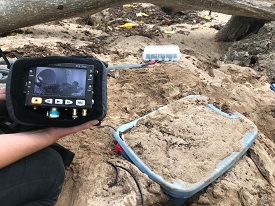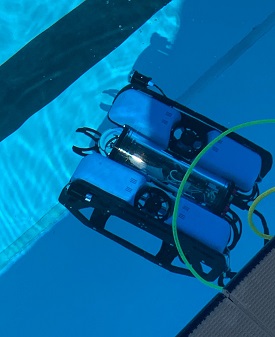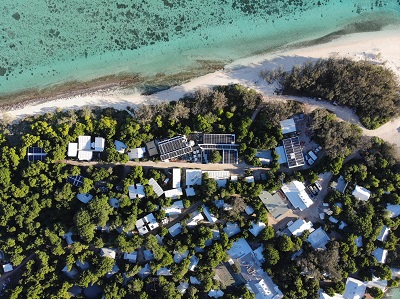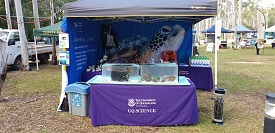Heron Island Research Station update
Bringing Heron Island to the world
 April saw a team from the BBC visit the Station to film part of a new live documentary ‘Blue Planet Live’. The BBC team showcased the flora and fauna of Heron Island and Heron Reef live to the UK public as well as bringing researchers from all over Australia to the Research Station to discuss their research to protect coral reefs both here and abroad. HIRS staff were excited to see all the frantic activity and played an important role in making sure the live crosses ran smoothly.
April saw a team from the BBC visit the Station to film part of a new live documentary ‘Blue Planet Live’. The BBC team showcased the flora and fauna of Heron Island and Heron Reef live to the UK public as well as bringing researchers from all over Australia to the Research Station to discuss their research to protect coral reefs both here and abroad. HIRS staff were excited to see all the frantic activity and played an important role in making sure the live crosses ran smoothly.
A new way to see the Reef
 Heron Island Research Station and Moreton Bay Research Station purchased two underwater Remotely Operated Vehicles (ROVs) in 2019. These light crafts will increase research and teaching capabilities at UQ and are fantastic tools for visiting researchers who wish to view the Reef without getting wet themselves. They are considered entry-level equipment and will provide increased opportunities for underwater research, and also build user confidence in operating this new equipment. The ROVs would also extend the ability researchers have to conduct underwater activities that are at depth and high risk in nature. These vehicles include a platform to attach sensors, video and mechanical manipulating devices for a variety of purposes across a range of scientific and engineering-related activities. The ROV will additionally be able to collect small objects from the reef with the aid of a grabber arm, providing another potential use for the submersible craft for our visiting research teams.
Heron Island Research Station and Moreton Bay Research Station purchased two underwater Remotely Operated Vehicles (ROVs) in 2019. These light crafts will increase research and teaching capabilities at UQ and are fantastic tools for visiting researchers who wish to view the Reef without getting wet themselves. They are considered entry-level equipment and will provide increased opportunities for underwater research, and also build user confidence in operating this new equipment. The ROVs would also extend the ability researchers have to conduct underwater activities that are at depth and high risk in nature. These vehicles include a platform to attach sensors, video and mechanical manipulating devices for a variety of purposes across a range of scientific and engineering-related activities. The ROV will additionally be able to collect small objects from the reef with the aid of a grabber arm, providing another potential use for the submersible craft for our visiting research teams.
During August the Science Workshops and Research Station staff attended a three day Blue ROV workshop at UQ, where they learned to assemble, maintain, service and operate the ROVs in the UQ pool.
Solar-assisted power station
 This year the power services at HIRS have received a major upgrade with the construction and installation of a solar-assisted power station; which means that HIRS is now independently supplying its own power!
This year the power services at HIRS have received a major upgrade with the construction and installation of a solar-assisted power station; which means that HIRS is now independently supplying its own power!
The solar modules extend across 22 roofs and the system is equivalent to approximately 40 residential solar systems. The batteries, which can switch between charging and discharging in under 25 milleseconds, store enough energy to support the station for 7-12 hours when fully charged, depending on the station’s demands. In addition, the battery electrolyte doesn’t degrade like that of other batteries, and will be recycled into new batteries at the end of its 20-year lifespan. The micro-grid meets over 80% of the station’s energy needs with renewable energy.
HIRS thanks all our clients for their patience and understanding during the construction and commissioning phase of this project. Research opportunities now exist to explore solar micro-grid systems on island and remote sites.
New Equipment
Throughout the year, HIRS has sought to update existing laboratory equipment after many years of trusted use. This included the replacement of half of our student microscopes mid-year, with the remaining microscopes to be replaced in early 2020. Additionally, HIRS will be receiving a new high-powered compound microscope, refrigerated centrifuge, mini centrifuge, light sensor and water quality multimeter throughout the year, to improve research outcomes for visiting research teams.
Ecofest
 HIRS participated in the local Ecofest event held by The Gladstone Regional Council. This event, titled ‘Slim your bin with a low waste diet’, attracted over 6,200 locals who were interested in learning more about waste reduction. The HIRS stall featured displays on marine debris and was very popular amongst the locals.
HIRS participated in the local Ecofest event held by The Gladstone Regional Council. This event, titled ‘Slim your bin with a low waste diet’, attracted over 6,200 locals who were interested in learning more about waste reduction. The HIRS stall featured displays on marine debris and was very popular amongst the locals.
